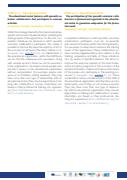ITEM 4.2.3 Educational Center The educational center features with sporadic vo- lunteer collaborators that participate in concrete activities Completely / Enough / Something / Nothing Within the strategy shared by the interested parties, specific actions are included aimed at satisfying the training needs of the apprentices. To this end, coo- peration initiatives are planned in which sporadic volunteer collaborators participate. This makes it possible to improve the response capacity of VET to the evolution of demand in the labor market. [one. European. See: EQAVET P2,I2]. As stakeholders in the educational organization, within the staff block, we can find the employees and volunteers. Along with outside vendors, these two can be educators in the organization. Volunteers include people who provide a service to the educational organization without compensation (for example, people who serve on committees, visiting speakers). They may have more than one type of relationship with an educational center (they may be apprentices in tra- ining who collaborate in courses, internships, etc. based on their professional, training, etc. experien- ce). [two. International. See: ISO 21001:2018 – Sec- tion 7.1.2.1 and Annex C].ITEM 4.2.4 Educational Center The participation of the sporadic volunteer colla- borators is planned and regulated in the educatio- nal center to guarantee adequation for the forma- tive needs Completely / Enough / Something / Nothing Cooperation initiatives in which sporadic volunteer collaborators participate must be conveniently planned and scheduled within the training itinerary. It is necessary to determine in advance the training needs of the apprentices. These collaboration ac- tions must be regulated above all in relation to the training, experience and skills of these collabora- tors, by means of specific indicators. The aim is to improve the response capacity of the Dual Profes- sional Formative programs to the evolution of the demand in the labor market and improve the results of the people who participate in the learning pro- cesses [1]. European. See: EQAVET P2, [2]. These collaborators will be considered part of the staff of the educational organization and therefore an inte- rested party, even if they do not receive a reward. They may have more than one type of relations- hip with an educational organization (they may be apprentices in training who collaborate in courses, internships, etc. based on their professional, trai- ning, etc. experience). [two. International. See: ISO 21001:2018 – Section 7.1.2.1 and Annex C].
